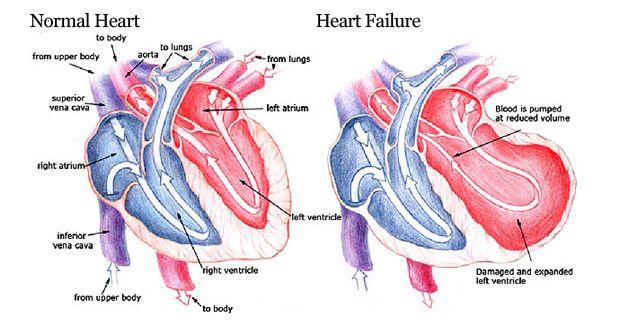Heart Failure NCLEX Questions
Heart failure is a situation in which the heart is too weak to perform effective cardiac output to maintain proper body metabolic needs. There are different kinds of heart failure, like left or right-sided heart problems. The heart failure NCLEX questions evaluate your skills regarding heart failure issues to provide effective nursing care.
As an aspiring nurse, it's crucial to understand how clients will manifest various types of heart failure. Besides, you need to be familiar with the causes, risk factors and nursing interventions for heart failure. Naxlex is a trusted brand that provides first-class heart failure NCLEX questions. Get a guaranteed A in the NCLEX with Naxlex heart failure practice questions .

Common Areas Tested in Heart Failure NCLEX Questions
Scoring good grades in heart failure questions requires nursing candidates to master the commonly evaluated topics and concepts. The NCLEX test evaluates heart failure-related questions from several content areas such as client education, side effects of drugs, and significant symptoms manifested by clients with heart failure problems.
Heart failure is the number one cause of hospitalization for patients above 65 years, and it's a major cause of death in the US. To equip you with the appropriate knowledge for cardiac failure issues, the heart failure NCLEX questions will help you master the following areas;
-
What causes different types of heart failure
Causes of heart failure NCLEX
Heart failure problems can be caused by different conditions, such as coronary artery illness, high blood pressure, diabetes, cardiomyopathy, valvular problems and congenital disorders. Other causes of heart failure may be serious, such as infections or cancer. Heart failure NCLEX questions can prepare you well ahead of the NCLEX test.
Types of heart failure NCLEX
In order to offer effective nursing care to heart failure patients, nurses must understand the different types of heart failures. The two main types of heart failure are systolic and diastolic.
Systolic heart failure happens when the left ventricle is stiff, making it hard for the heart to contract and relax accordingly. Conversely, diastolic heart failure happens when the left ventricle enlarges and weakens, causing blood to spread to the lungs. This makes it difficult for oxygen to reach other parts of the body. Naxlex heart failure NCLEX questions easily summarize these topics, helping you master the content quickly.
Major risk factors for heart failure NCLEX
Risk factors for cardiac failure are conditions that increase the chances of having heart failure problems. As a nurse, knowing factors that can increase heart failure can help you provide proper nursing strategies to your patients. While there are different risk factors, the three major risk factors for heart failure are high blood pressure, high cholesterol, and smoking.
Several health conditions, lifestyle, age and family history can boost your risk for heart failure problems. Approximately half of all Americans have at least one of three major risk factors for cardiac failure: high blood pressure , smoking and high cholesterol. While some risk factors like age and family background cannot be controlled, you can lower the chances of heart failure by controlling factors within your control.
Health conditions that can increase heart failure include high blood pressure, blood cholesterol levels, diabetes mellitus, and obesity. Behaviour or lifestyle can also increase heart failure problems. Some high-risk behaviours are eating fatty foods, not getting enough physical activity, drinking excessive alcohol, and smoking. Heart failure NCLEX questions provide practical information on the different risk factors for heart failure.
Diagnosis and treatment of heart failure NCLEX Questions
As a nurse handling patients with heart failure problems, you must have the skills to carry out the diagnosis process effectively. The process begins by examining the patient and asking questions about the symptoms they manifest and any medical history they have. The nurse will check if the patient has risk factors for heart failure such as high blood pressure and diabetes, among other known factors.
You will use a device called a stethoscope to listen to the patient's lungs and heart. A whooshing sound may be heard when listening to the heart. Besides, during the diagnosis process, the nurse looks at the veins in the patient's neck and checks for swellings in the belly and legs. Heart failure NCLEX questions will evaluate your competencies in all these areas.
Aside from physical assessment to check cardiac failure, different tests may be conducted to diagnose heart failure issues. The common tests done include blood tests, chest X-ray, electrocardiogram (ECG or EKG) , echocardiogram , ejection fraction, exercise tests/ stress tests, CT scan of the heart, heart MRI, coronary angiogram, and myocardial biopsy.
Once the heart failure has been identified, appropriate nursing intervention must be considered. The treatment approach for the identified heart failure may vary depending on the cause. Common treatment solutions involve lifestyle changes and medications. If a different health problem is causing heart failure, treating the health issue may reverse heart failure.
Some patients with heart failure may require surgical procedures to open obstructed arteries or to put a device to have the heart work properly. With appropriate treatment methods, the signs and symptoms of heart failure may improve. If you want to grasp heart failure content, utilizing heart failure NCLEX questions in your study process can be a great decision.
A combination of drugs can be used to treat heart failure problems. The medication used to treat the disease varies with the symptoms and the cause of the heart failure. Some of the drugs used to treat heart failure include angiotensin-converting enzyme, angiotensin II receptor blockers, angiotensin, receptor plus neprilysin inhibitors, beta blockers and diuretics, among others. Heart failure NCLEX questions can be a resourceful tool to sharpen your skills on the different drugs used to treat heart failure.
Conclusion on Heart failure NCLEX questions
Heart failure NCLEX questions are crucial components of the nursing licensure exam. The questions evaluate the candidate's mastery of different aspects of heart failure. Important content evaluated includes types of heart failure, major risk factors, signs and symptoms of heart failure, and Diagnosis and treatment of heart failure diseases. If you want to prepare effectively for the NCLEX, Naxlex test prep heart failure questions guarantee you an A. Try Naxlex now for a guaranteed pass or a money-back guarantee.
Start your journey with us today
Join 1000+ Nursing Students
Powerful learning and clinical tools combined into one platform. The Naxlex Knowledge and Qbanks give you instant and on-the-go nursing knowledge and guidance.




